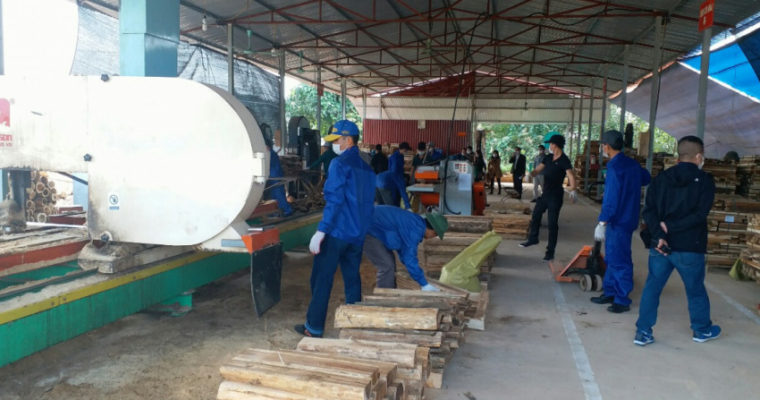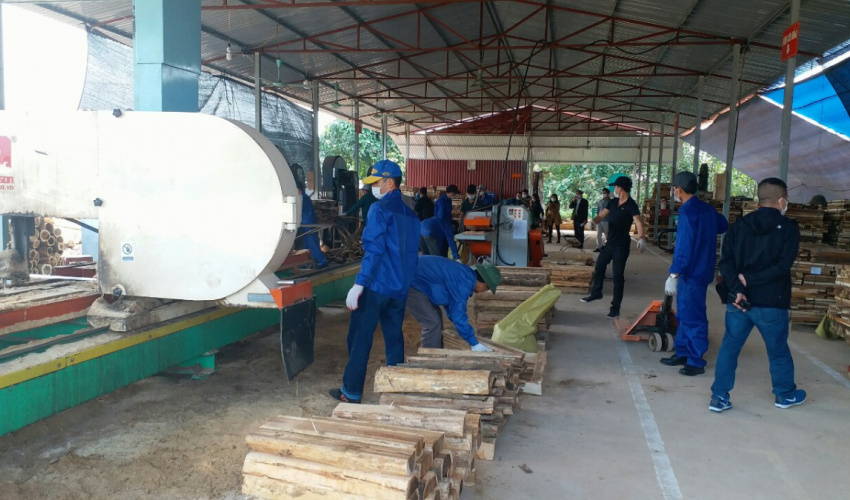This article was originally published by IUCN
Binh Minh Agroforestry Cooperative in Yen Bai Province in northern Viet Nam exemplifies how a cooperative can improve the lives of communities. A group of 18 farmers transformed itself from an informal group into the registered cooperative, with 60 hectares of Forest Stewardship Council certified plantation and a chain of custody certified sawmill with a capacity of 700 m3 of processed timber per month. The lessons from the journey of this cooperative are many.
A vital contribution that Binh Minh Agroforestry Cooperative (BMAC) makes to its community is by generating profits and jobs. In 2020, BMAC made a profit of 147.85 million VND (US$ 6,406) and created several jobs for local people with daily wages from 230,000 VND to 270,000 VND (US$ 10 to 12). BMAC provides stable jobs for local people, including women, youth and the aged, with labour safety always taken into consideration.
BMAC’s main products include Forest Stewardship Council (FSC)-certified acacia sawn logs. Its major customer is Hoa Phat Industrial Ltd, a large timber processing company in northern Viet Nam and an IKEA (international furniture company) supplier. BMAC promotes environment positive outcomes through ensuring legal timber sourcing, prohibiting the use of most herbicides, and reducing pollution and littering.
The transformation of BMAC from an informal group of farmers to a registered cooperative was made possible thanks to their active leader, the solidarity and capital availability of BMAC members, the presence of big companies, the stable development of the wood products market, and support from the government and partners.
Multistakeholder support makes a difference
A range of external actors – local government, private sector, Yen Bai Farmers’ Union and Forest and Farm Facility (FFF) – are contributing in different ways to helping BMAC. The provincial government has played a vital role in directing the forestry industry towards higher standards through FSC and value chain improvements. The private sector involvement with BMAC started through NAFOCO, a large timber processing company in northern Viet Nam, and later with Hoa Phat. NAFOCO is one of the first companies to apply IKEA’s IWAY code of conduct for responsible business. In September 2017, NAFOCO transferred the FSC project to Hoa Phat.
If it was not for FFF, people in Yen Bai would have never known about NAFOCO,” said Phung Binh Minh, Director of BMAC
FFF is a partnership between FAO, IUCN, IIED and Agricord and implemented in Viet Nam by the Viet Nam Farmers’ Union. Connecting forest and farmer producer organisations (FFPOs) and the Yen Bai Farmers’ Union to companies, investors and markets is the most important outcome that FFF has brought to BMAC. Clearly without an economic benefit, it would have been extremely hard to persuade people to work together. FFF also introduced FSC to farmers, local facilitators and forestry officers at the time when there was only one farmer group in the country that had received FSC certification.
To build capacity, FFF organised trainings for BMAC on market analysis and development, and organisational management for the group. It also provided small grants for technical trainings on FSC requirements for the cooperative members and other farmers’ groups. Through FFF, The Viet Nam Farmers’ Union / Yen Bai Farmers’ Union facilitated roundtable discussions at the commune, district and provincial levels to connect FFPOs with scientists, the private sector and decision-makers.
Thanks to that support, BMAC acquired an area large enough to set up a chain of custody timber processing workshop and became a cooperative capable of signing FSC timber supply contracts with companies.
Looking to the future
BMAC demonstrates that external actors in the value chain play important roles in providing market incentives, policy support, and capacity building to FFPOs. External assistance is vital for encouraging farmers to work together to do business, helping them understand the benefits of collective action, and facilitating the operation of the FFPO. A global review of FFPOs shows that 77% of FFPOs were established with external assistance from government programmes, non-governmental organisations projects or business partners.
Organising smallholders into FFPOs is a key step in commercialising their wood products. When farmers form FFPOs, they benefit from economies of scale, increased bargaining power, reduced transaction costs, better market access, and a joint voice to in?uence policy. It also becomes practical to invest together in forest certification.
The BMAC experience sheds light on several issues facing Viet Nam’s forestry sector, notably how to organise more than one million smallholders into successful FFPOs – and how to move from short rotation acacia for woodchips to long rotation with sustainable forestry management certifications and FSC certified acacia for furniture grade timber. Overall, the process of FFPO development and the role of The Viet Nam Farmers’ Union and other actors can provide important business incubation services to smallholders. Smallholders just like BMAC.
Source: https://www.iucn.org/news/forests/202202/how-cooperatives-can-help-forest-and-farm-communities-rural-viet-nam





Comments are closed